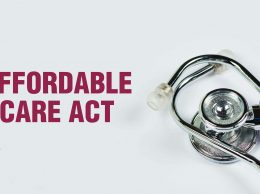Op/ed: Health care reform is ultimately a question of justice
By Ross Goldberg
The preamble to America’s Constitution speaks of our nation’s desire to “establish justice.” But nowhere in those 52 words or in the document that follows is justice defined. Instead, the founders have left that responsibility to us, the citizenry, to define what justice means in our time and what it means to be “just” in a civilized society.
More than half a century ago, President John F. Kennedy understood this when he framed the raging civil rights debate not as a legal challenge but as a moral issue. He asked who among white Americans would willingly change the color of their skin and live with the fears and injustices facing African Americans then residing in many of our southern states.
The debate that continues to surround health care reform is a moral issue as well. Sadly however, we muddied the matter nearly two years ago by letting nine men and women sit in judgment and give a narrow thumbs-up to its constitutionality. But health care should never have been theirs to judge. The courts, the lawyers and the law books aren’t justice but are merely symbols of our desire to be just. Yet it is one of the peculiar tragedies of today’s America that so many of our moral issues end up being adjudicated in this manner.
America’s health care industry includes 5,200 hospitals, more than 750,000 physicians and three million nurses, plus allied health professionals, health plans, pharmaceutical companies, long-term care facilities and much more. It is a nearly $3 trillion industry that consumes 18 percent of our gross domestic product, yet few people believe that we are getting our money’s worth.
Every year we lose ground to the rest of the industrialized world, and we face the stark reality that, still today, far too many of our fellow citizens go to bed every night worried they and their family may not get the care they need or that one catastrophic illness will destroy a lifetime of hard work, careful savings and honorable dreams.
Despite the fact that millions of Americans enrolled in the program in its first year alone, those who continue to find the ACA unappetizing have much to glow about as they bask in an orgy of failures. The online launch in 2013 was a debacle, President Obama’s promise that “you can keep your health care” has been consigned to a memory bin, insurance premiums are rising at record rates and the government is failing to attract the younger citizens needed to make the system financially viable.
Laying bare the legal briefs, health care reform of any kind turns on one moral question: Is healthcare a right to which every American is entitled? If we are a nation founded on the pursuit of happiness, must the assurance of affordable, accessible, quality healthcare be guaranteed to all? Can we really form a more perfect union without it? I would hope that Democrats and Republicans alike would call upon the better angels in their character and agree that yes, indeed, no American should go without health care. In that we are all morally invested, for the real issue has always been not who wins the healthcare debate, but who loses if inequities continue to exist.
Just as speed limits won’t stop all highway accidents, the Affordable Care Act hasn’t cured all the inherent ills in today’s health care system. Multiple tiers of coverage continue to exist and the homeless person doesn’t get the same care afforded to Donald Trump. Physician shortages are being exacerbated by the new influx of insured individuals. Hospitals continue to be paid by the government only a fraction of what it costs to treat people on Medicare on Medicaid. The forms to apply for tax credits and subsidies have proven to be too confusing. And because it is government-run, the ACA is filled with inefficiencies and fat. In short, the system continues to be imperfect.
But imperfection is part of the arc of America, too, making it the responsibility of each generation to try to make America work better. Unlike the Clinton effort for health care reform that was dead on arrival in the 1990s, today there is universal agreement that reform is needed. But there is also a declining number of Americans who support the current legislation and more who feel that we can do better.
The “we” is us and ultimately it is up to us, the citizenry, to let our voices be heard and reaffirm the confidence our nation’s founders displayed in us 228 years ago. Doing so as it pertains to health care will not only test our resolve and our patience, but it will also tell us just what kind of country we are. I already know what kind of country we are. We are a great and compassionate country. We are a country of values and virtues. And most of all, we are just.
• Ross Goldberg is past chairman of the board of trustees at Los Robles Hospital and Medical Center and president of Kevin/Ross Public Relations in Westlake Village.












